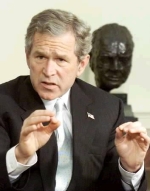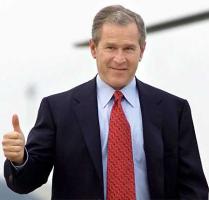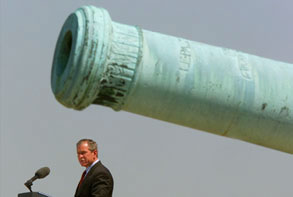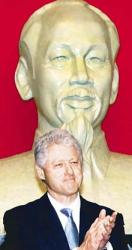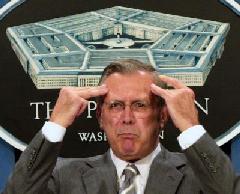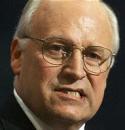The best news about the Vice Presidential debate tonight is that it will almost surely be the least significant of any of the debates held. Last week we got a serious, substantive debate between John Kerry and George W. Bush, and (to my wildly partisan eyes, at least) a confident and thorough stomping by Kerry all over Little Lord Bush. (I still would much rather that I could vote for John Kerry in 1971, but it’s a fallen world and you’ve got to take what you can get.) Tonight, what we got was a series of weak and poorly-connected attacks between two non-respsonsive soundbite machines, a vituperative bull session without any clear upshot for anyone. Dick Hordak
Cheney was appalling as always; John Edwards surprised no-one (I hope) by turning out to be a smiley face atop an empty suit.
That’s not the main topic for this post, though; the Veep debate was way too lame to justify a post about it. Rather, I want to follow the candidates’ own procedure and talk for a while about some tangential point that happened to be raised along the way even though it has nothing to do with the question. During one of his most meandering answers, Edwards tried to run to the right of the Bush Administration on the Israeli-Palestinian conflict. Along the way he offered the following nugget of conventional wisdom about the predicament of the Sharon government:
They don’t have a partner for peace right now. They certainly don’t
have a partner in Arafat, and they need a legitimate partner for
peace.
But why in God’s name do they need that?
Israel did not look for a partner for peace
in South Lebanon. They are not looking for a partner for peace
in Gaza.
We need to think carefully about what trying to find a partner for peace
means in this context. You might, of course, wonder whether the Palestinians have a legitimate partner for peace
in the government of Ariel Sharon; you might well, on the other hand, agree that Arafat is a crook and a thug, that he has failed ordinary Palestinians countless times, and that there is little hope for any substantial progress of any sort with him. But how did Arafat come to hold the position of power that he holds now? What process legitimated his Fatah cops and his authoritarian regime? Oh yes, it was the negotiated peace process
. When American or Israeli politicians talk about trying to find a partner for peace
what that means is hand-picking someone who will be reliably agreeable in negotiating on behalf of all Palestinians. What it means is that the occupation has to keep on its long, bloody, deadly grind until politicians from Israel and from the U.S. have effectively handed over the reins of power in the Palestinian community to someone based on their negotiating priorities. What that means is giving tremendous power and resources to a select few and expecting this elite–created from the coercive pressure of the occupation, with no authorization from the Palestinians that the partner for peace
claims to speak on behalf of. That’s what they did for Arafat and Fatah, and that’s what they are trying to do now for Fatah officials seen as more moderate
or more reliable
; but the whole history of the colonial and postcolonial world should tell you that hand-picked elites cannot be trusted not to abuse the power and resources they are given–least of all hand-picked elites whose claim to legitimacy derives from the occupying power. The record is as clear in the occupied territories as anywhere else: an Oslo-style negotiated process, and the requisite partner for peace
propped up Yasser Arafat as the stand-in for the Palestinian people as a whole, and hand-picked Fatah as the government for the Palestinian Authority. It has not moved the peace process forward; it handed tremendous power and resources within the Palestinian community to bandits and street thugs. It has made a terrible situation worse, with every passing day, for ordinary Palestinians and ordinary Israelis.
Sooner or later Edwards and Cheney and Sharon and Barak and the rest of them are going to have to realize that peace through hand-picked partners for peace
doesn’t work. It provides only the illusion of a peace process. There’s a moral here, for both the United States in Afghanistan and Iraq, and for Israel in Gaza and the West Bank. The answer is not negotiating (which legitimates and empowers any gangster who happens to attach himself to the peace-process teat). If you think that you can handpick a good government for the people underneath the boots of your military, and if you think that refusing to lift those boots from off their necks until you have found the right one for them, is a good way to promote peace, freedom and human flourishing, then you are on the wrong side of history. But continuing an indefinite occupation is intolerable (as the majority of Israelis already realize, and as most Americans are swiftly learning). So what is to be done?
Isn’t it obvious? Quit trying to negotiate and quit trying to stay; unilaterally withdraw, and let the once-occupied people decide their own fate rather than trying to hand-pick a new State for them before you leave. In Gaza, in the West Bank, in Iraq, in Afghanistan, what we all need to do is: quit trying to find a partner for peace
, quit trying to win
, and just get the hell out.
Getting the hell out and leaving people alone. Now that would be a nice model for that broader Middle East
.
Further reading







